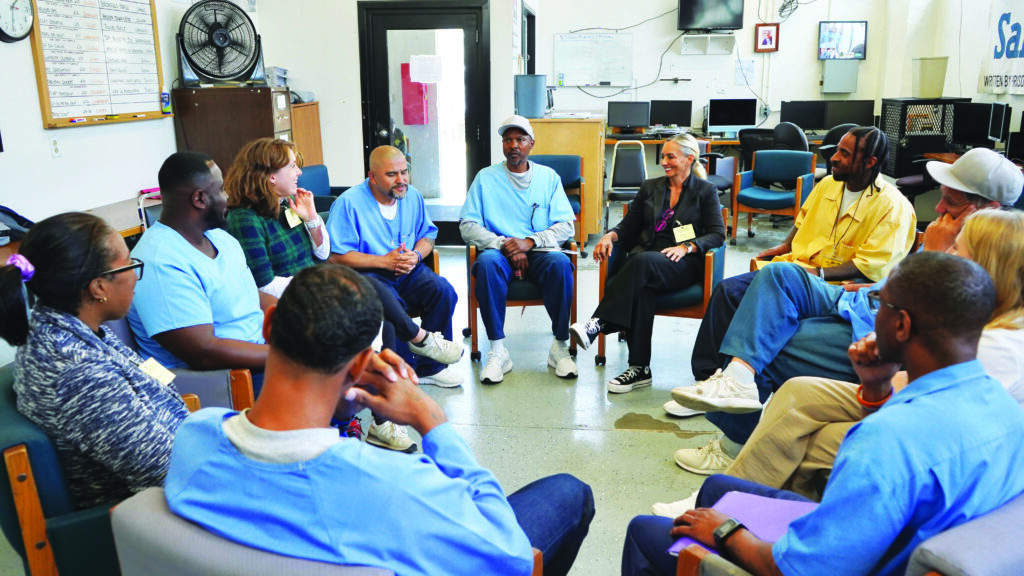
Abandonment, gang culture, substance abuse, death, violence in the home and neighborhoods — all of these were the subjects of dialogues between SQRC residents and members of The Prosecutors Alliance.
All those issues contribute to the social, environmental, and economic conditions that foster criminal thinking and behavior.
Artie Gonzalez, program director for The Prosecutors Alliance, a reform-oriented law enforcement association, came into San Quentin with district attorneys from Contra Costa and Yolo counties to talk with residents about the traumas and conditions that left incarcerated individuals with years of hurt and some bad choices.
“Trauma left me feeling alone and abandoned,” resident Delvon Adams said. “My high school friend died; from that point I said I was not going to college.”
Prosecutors Alliance bridges the gap by bringing prosecutors, victims’ advocates, crime survivors, and allies committed to creating safer, healthier communities. The organization works with local and state leaders for sustainable solutions that advance public safety. This is in line with SQNews’ belief that communication between victims and offenders can strengthen feelings of community between them and open up possibilities for meaningful solutions.
“I find a lot of hope that individuals who are most effective in coming up with solutions are those inside prison,” said Prosecutors Alliance Executive Director Cristine Soto Deberry. “There is no part of the system where prosecutors see the facility and the people experiencing incarceration. The end should not be in the courtroom. I am doing my part to break down that wall so prosecutors can see how is it going and how can we change.”
SQ News’ Eric Allen emceed the hours-long event. “Trauma impacted my life crime. We were not born bad people, we just started making bad choices.”
Dozens of residents shared their traumatic experiences, accountability, what sparked their transformation, and ideas on how to prevent further harm and criminality.
“I hid my trauma. People outside the home saw what you wanted them to see,” resident Johnny Mason said. “Fear was not instilled in us. When you show fear you can get hurt.”
Resident Alonzo Jackson said he and his friends were engaged in prosocial activities such as sports but they enabled each other’s bad behaviors all the same. “I learned the right way to do all the wrong things.” He said he joined a gang at the age of 14 due to insecurities and abandonment issues.
He said he and his friends were not taking their lives seriously. For example, being shot at and laughing about it later, or friends getting shot or killed were all normalized.
“I normalized consequences and had no foresight of the ripple effect and consequences from my actions,” Alonzo said.
“Violence was happening inside the home before I realized how violent it was outside my home,” Jason Jenkins said. “Joining a gang was a rite of passage because my family was in the gang. My environment shaped my reality as a kid.”
Several residents provided ideas such as teaching emotional intelligence to kids, more investment into youth programs, improvements to the foster care system, and improvements to a system that understands the complexity of rehabilitation. Some said the individuals in the room could mentor the youth and be assets to the community outside.
“I did not believe before that I was a good person. Now I ask myself why I am feeling this way and why are you,” resident Michael Moore said.
Other solutions mentioned were more job skills and vocation skills, self-help programming in all prison and juvenile facilities, and structural improvements to offer more humane conditions.
“I look back and I am disappointed how I viewed the world and I lost who I was,” resident John Schoppe-Rico said. “I felt that I was victimized but I became the monster I was scared of as a kid, and the prison system perpetuated my criminality and victim stance.”
Schoppe-Rico said time spent in his segregated housing unit, faith, and family sparked a change in his mindset. “Before, I failed to ask the right people for help and I needed my fellow guys in blue to support me and make a change.”
“I am passionate to reform the system. It is going to take big systemic change to help everybody. To create safe communities outside it is about changing people,” guest Kobi Salinas said.